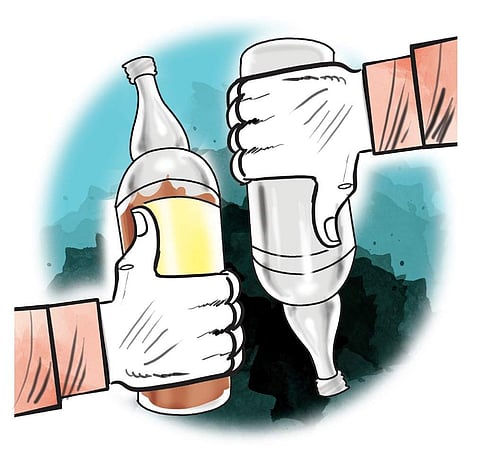

CHENNAI: Is the right to drink alcohol an undeniable right guaranteed by the Constitution? While a two-member bench of the Patna high court on Friday unanimously ruled against prohibition in Bihar on other legal grounds, the judges differed among themselves in the most interesting question raised in the case.
“In my opinion, right to drink alcohol, like a responsible citizen, is a part of right to privacy…” observed Justice Navaniti Prasad Singh, who almost equalled alcohol to drinking water and hence a basic fundamental right protected by the Constitution, the basic law of the country which other laws can never overrule. But his brother judge and Chief Justice of the High Court Iqbal Ahmed Ansari differed. He observed that access to liquor can be claimed as a matter of right only until the government bans it.
The main ground of his reasoning was the Article 47 of the Constitution which states the Indian state “shall endeavour” to enforce prohibition. Since prohibition is set as a directive principle of the State policy set by the Constitution itself, no citizen can complain of violation of his fundamental right when a constitutional mandate is enforced by the governments.
“To me, it appears that the argument, in effect, is that drinking of water is same as consumption of an intoxicating drink, such as, alcohol. However, had it been the same, the founding fathers of the Constitution would not have, with the help of Article 47, cast an obligation on the State to bring about prohibition in the governance of the State,” the Chief Justice Iqbal Ahmed Ansari observed.
But Justice Navaniti Prasad Singh was of the view that liquor consumption in itself is not injurious, but only abuse of it. “On the plea of mere possibility of abuse by some persons, the right of others cannot be abrogated. In my view, if the State starts dictating a citizen what to drink or what not to drink, though the same is not per se injurious to health, it would be a direct intrusion on personal liberty affecting meaningful life. It would be violation of personal liberty guaranteed by the Constitution,” he said in his judgment. He also observed that liquor has been categorised as “food” under the food safety regulations.
In his verdict, which he wrote after reading the judgment written by Justice Singh, Chief Justice Ansari disputed the various interpretations of previous rulings that Justice Singh relied on.
He cited the precedents set by Constitutional benches and observed the right to trade or consume liquor is only until the state government bring prohibition.
“If the State allows consumption of intoxicating drinks, and if someone consumes it in the privacy of his own house in terms of the licence, which he may have been given, no intrusion to his right to consume potable liquor can be permitted unless the State alleges violation of the licence itself,” Justice Ansari said.
But liquor cannot be equated to water or food since Article 47 of the constitution specifically casts a duty on the government to bring prohibition. Referring to Justice Singh’s observations that for 65 years after independence still not many governments have imposed prohibition, the Chief Justice observed that while the Constitution has endeavoured the government to enforce prohibition, it is the for the government to decide on the timing and it can’t be challenged on basis of fundamental rights.
The law was introduced by Chief Minister Nitish Kumar earlier this year with provisions, which some quarters termed Draconian in letter and spirit. The Bihar government is awaiting a copy of the High Court order and weighing its legal options to take on the judgment.